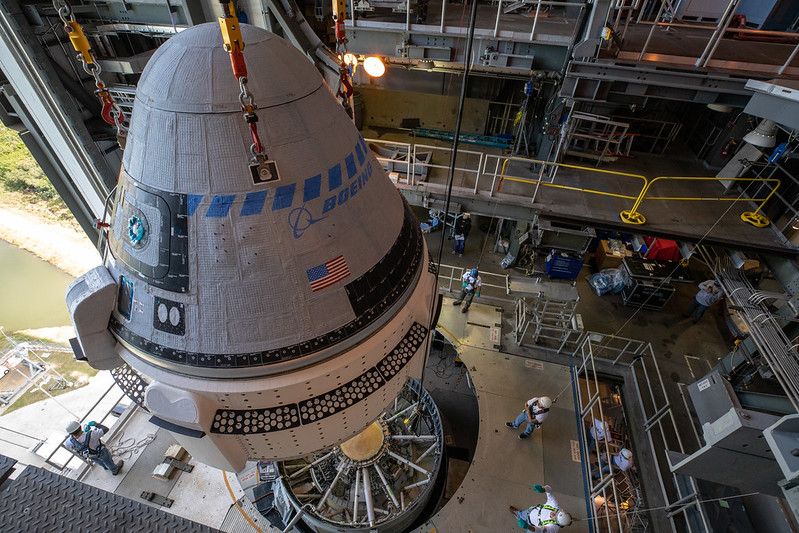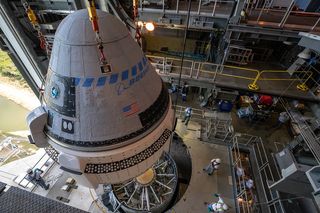Boeing has pushed back the launch debut of its Starliner spacecraft to Dec. 19, a two-day delay, due to a glitch with the spacecraft's Atlas V rocket.
The uncrewed Starliner test flight, which will launch the Boeing capsule's first round trip to the International Space Station, will now launch no earlier than Thursdays, Dec. 19, at 6:59 a.m. EST (1159 GMT). The 48-hour delay will allow engineers to address a "purge air supply" issue on the Atlas V rocket built for the mission by the United Launch Alliance (ULA), a joint venture by Boeing and Lockheed Martin.
"Both the rocket and the spacecraft are healthy and moving through standard pre-launch processing," Boeing representatives wrote in an update on Twitter.
Related: In Photos: Boeing's Starliner Pad Abort Test Launch
Boeing's Starliner space capsule is designed to launch astronauts to and from the International Space Station under a commercial crew contract with NASA. The spacecraft will launch at least four astronauts to the space station for a long-duration mission and return them to Earth, using parachutes and airbags to land in California's Mojave Desert.
On Nov. 21, Boeing unveiled its first Starliner spacecraft, attaching it to the Atlas V rocket that will launch it to the International Space Station later this month on the Orbital Flight Test, or OFT, test flight. The uncrewed test flight "will provide valuable data on the end-to-end performance of the Atlas V rocket, Starliner spacecraft and ground systems, as well as in-orbit, docking and landing operations," NASA officials have said.
Related: How Much NASA Is Paying Per Seat on SpaceX's Crew Dragon & Boeing's Starliner
Earlier in November, Boeing successfully launched a pad abort test flight to check Starliner's escape system designed to pull the spacecraft free of its rocket in an emergency.
Boeing is one of two U.S. companies with NASA contracts to fly American astronauts to space on private spacecraft. The other company is SpaceX, which successfully launched its first uncrewed Crew Dragon test flight to the space station in March of this year. SpaceX is also expected to launch an in-flight abort system test flight later this month.
NASA currently expected Boeing and SpaceX to begin flying astronauts to space in 2020. That will be a major turning point for NASA, which has been dependent on Russia's Soyuz spacecraft for crew launches since the agency's space shuttle fleet was retired in 2011.
Earlier in November, Boeing successfully launched a pad abort test flight to check Starliner's escape system designed to pull the spacecraft free of its rocket in an emergency.
Boeing is one of two U.S. companies with NASA contracts to fly American astronauts to space on private spacecraft. The other company is SpaceX, which successfully launched its first uncrewed Crew Dragon test flight to the space station in March of this year. SpaceX is also expected to launch an in-flight abort system test flight later this month.
NASA currently expected Boeing and SpaceX to begin flying astronauts to space in 2020. That will be a major turning point for NASA, which has been dependent on Russia's Soyuz spacecraft for crew launches since the agency's space shuttle fleet was retired in 2011.
- Photo Tour: Inside Boeing's CST-100 Starliner Spaceship Hangar
- Boeing Unveils New Spacesuits for Starliner Astronaut Taxi (Photos)
- Photos: Meet the 'Boeing Blue' Spacesuit for Starliner Capsule
Email Tariq Malik at tmalik@space.com or follow him @tariqjmalik. Follow us @Spacedotcom and Facebook.


